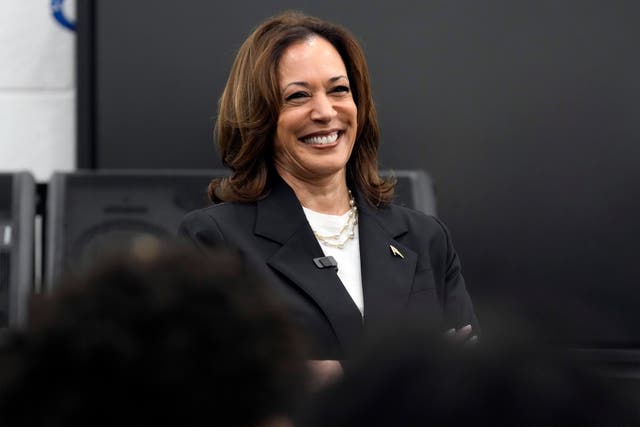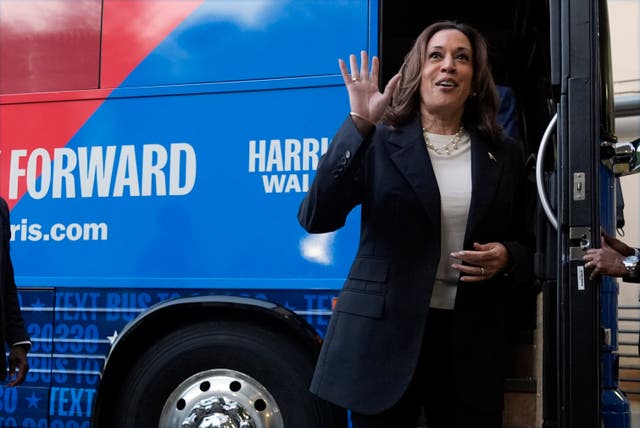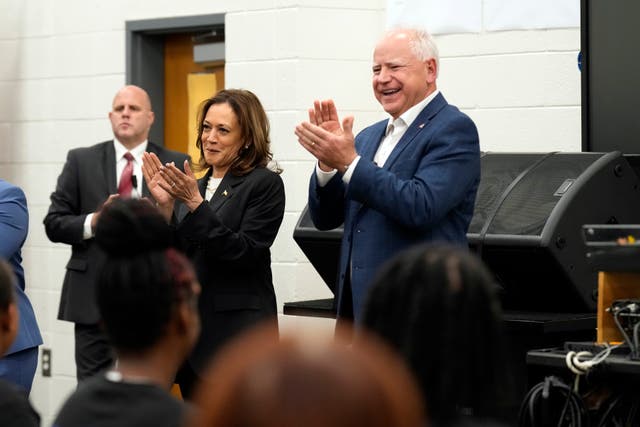Harris says values ‘have not changed’ in first sit-down interview of campaign
Kamala Harris was questioned along with running mate Tim Walz in their first major television interview of their US presidential campaign.

US Vice President Kamala Harris has said her values “have not changed” as she was questioned along with her running mate Tim Walz in their first major television interview of their presidential campaign.
The interview with CNN’s Dana Bash gives Ms Harris a chance to quell criticism that she has eschewed uncontrolled environments, while also giving her a fresh platform to define her campaign and test her political mettle ahead of an upcoming debate with former president Donald Trump set for September 10.
But it also carries risk as her team tries to build on momentum from the ticket shakeup following Joe Biden’s exit and last week’s Democratic National Convention.

The full CNN interview is set to air at 9pm local time. It was taped at Kim’s Cafe, a local Black-owned restaurant in Savannah, Georgia and an excerpt was released on Thursday afternoon.
In it, Ms Harris was asked about changes in her policies over the years.
“I think the most important and most significant aspect of my policy perspective and decisions is my values have not changed,” Ms Harris replied, citing as evidence her support for climate change legislation and border security.
Joint interviews during an election year are a fixture in politics – Biden and Harris, Trump and Mike Pence, Barack Obama and Biden — all did them at a similar point in the race.
The difference is those other candidates had all done solo interviews, too.
Ms Harris hasn’t yet done an in-depth interview since she became her party’s standard bearer five weeks ago, though she did sit for several while she was still Mr Biden’s running mate.
Ms Harris and Mr Walz are still introducing themselves to voters, unlike Mr Trump and Mr Biden of whom people had near-universal awareness and opinion.
They were in the midst of a two-day bus tour through southeast Georgia that culminates with an evening rally in Savannah.

Harris campaign officials believe that in order to win the state over Mr Trump in November, she must make inroads in GOP strongholds across the state.
Ms Harris, during her time as vice president, has done on-camera and print interviews with The Associated Press and many other outlets, a much more frequent pace than the President — except for Mr Biden’s late-stage media blitz following his disastrous debate performance that touched off the end of his campaign.
Ms Harris’ lack of media access over the past month has become one of Republicans’ key attack lines. The Trump campaign has kept a tally of the days she has gone by as a candidate without giving an interview and have suggested she needs a “babysitter” and that is why Mr Walz will be there.
Mr Trump has largely steered toward conservative media outlets when granting interviews, though he has held more open press conferences in recent weeks as he sought to reclaim the spotlight that Ms Harris’ elevation had claimed.
After the CNN interview, Mr Walz peeled off for other political events out of state, and Ms Harris continued in Georgia, stopping in at Dottie’s Market in Savannah on Thursday and chatting with the owner’s mother as crowds watched from the street.
She met with volunteers too, at a restaurant inside a former bus terminal, before she heads to a rally and then back to Washington.
“We’re a people-powered campaign,” she told the crowd. “You guys are doing the work on the ground and I can’t thank you enough.”
On Wednesday, Ms Harris and Mr Walz spent time with a high school marching band to the delight of students, and stopped by a Savannah barbecue restaurant.

Ms Harris has another campaign blitz on Labour Day with Mr Biden in Detroit and Pittsburgh with the election rapidly approaching.
The first mail ballots get sent to voters in just two weeks.
Democrats’ enthusiasm about their vote in November has surged over the past few months, according to polling from Gallup.
About 8 in 10 Democrats now say they are more enthusiastic than usual about voting, compared with 55% in March.
This gives them an enthusiasm edge they did not have earlier this year.
Republicans’ enthusiasm has increased by much less over the same period, and about two-thirds of Republicans now say they are more enthusiastic than usual about voting.





